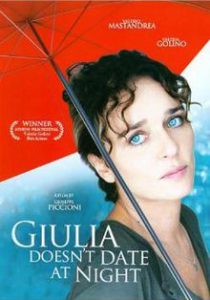Giulia Doesn’t Date at Night

Guido (Valerio Mastandrea) is a writer short-listed for an Italian book award, father of an adolescent girl and husband to a beautiful woman. He lives a good life, if by “good” you are willing to exclude the many double standards that are needed to sustain it. In many ways, Guido is a walking hypocrisy: he says he loves his wife, but finds every opportunity to not spend time with her; he implies that he dislikes the limelight of being an acclaimed author, but is vain enough to seek a book award; he is judgmental towards the works of his peers, but is himself working on two new projects that are both ridiculous and full of clichés.
Into this life of lies enters the stunning Giulia (Valeria Golino). She is the swimming teacher of Guido’s daughter, but soon ends up teaching Guido instead. Golino plays Giulia with a fascinating mix of lifelessness and intensity. Her eyes are blank, but also full of ache and yearning. Guido (and the audience) are mesmerized. He wants to take her out, but Giulia doesn’t date at night.
For us to believe Guido’s curious choice of extramarital lover, it helps that Valeria Golino is a beautiful woman. And yet we still have difficulties questioning the stupidity and destructiveness of it all. Giulia is as vulnerable as she is tough; emotionally zealous and drained at the same time. Guido feels empowered and enlivened by her dependence on him, and is inspired to use her story as material for his new book, which he has been struggling to write for a while. Where Guido’s life is based on deception (both professionally and emotionally), Giulia has no lies left to tell. Her only way to deal with the world is by hoping it will meet her honesty and regret with kindness and understanding. Guido’s wife challenges him to reconnect with her. Instead, he focuses on Giulia: drawing her out, learning of her past. Then he intervenes. Can a novelist write reality?
